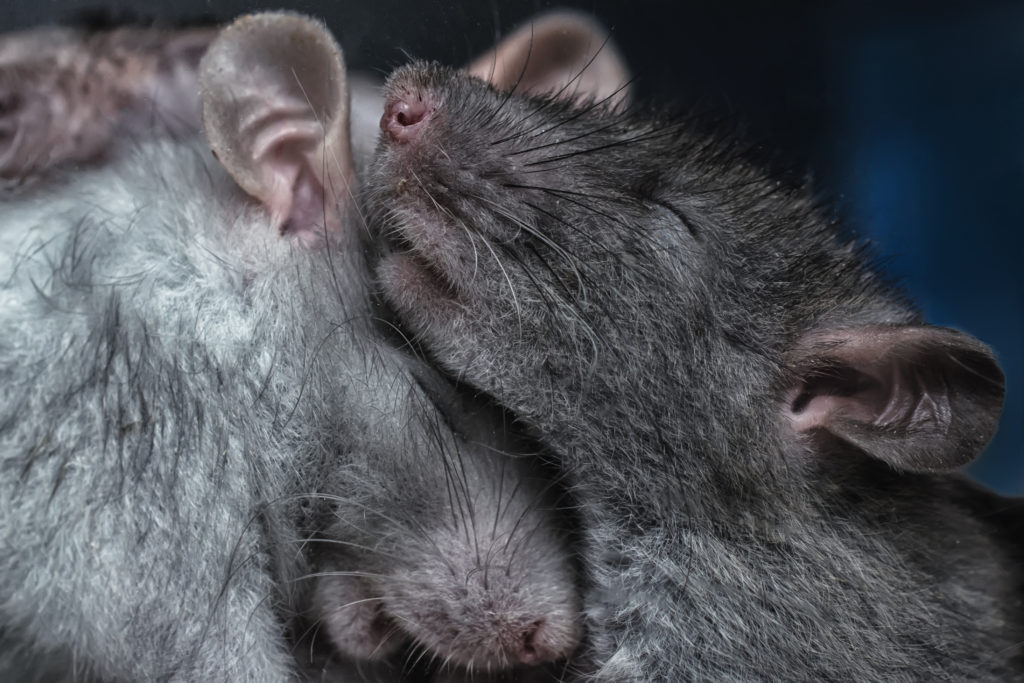Quick Hits
Daily brief research updates from the cognitive sciences

I have reported in other places on the social regions of the brain (for review see here). And this has indeed been the standard approach – try to identify the specific regions in the brain that engage in a particular activity.
However, this research adds an interesting twist to the concept of the social brain. Japanese researchers at Tohoku University and the University of Tokyo have discovered electrical brain wave patterns related to social behaviour in mice.
What did they find?
First, they found that there was a brain wave signature in social interactions. These came from regions we already know are associated with social behaviour namely a region called the medial prefrontal cortex, in the front of the brain, associated with social behaviours, and the amygdala which is well-known as an emotional and attentional centre.
When mice were socialising theta waves (slow waves) decreased and gamma (fast waves) increased. This is in itself interesting and gives another neural signature that is easier to measure than brain scanning. But mice that had poor social skills or that exhibited signs of depression or autism (yes, you can measure this in mice) lacked this brain wave pattern.
The critical question is: can these brain waves patterns actually influence social behaviour? Through optogenetics the researchers were able to stimulate the social brain wave patterns in these social dysfunctional mice and yes, their social behaviour normalised.
In short, a pretty amazing piece of research that shows that brain waves are critical to social interactions, and these can also be manipulated (in mice that is) to improve social behaviour. Not in humans yet, unfortunately!●

Andy Habermacher
Andy is author of leading brains Review, Neuroleadership, and multiple other books. He has been intensively involved in writing and research into neuroleadership and is considered one of Europe’s leading experts. He is also a well-known public speaker speaking on the brain and human behaviour.
Andy is also a masters athlete (middle distance running) and competes regularly at international competitions (and holds a few national records in his age category).
Reference
Nahoko Kuga, Reimi Abe, Kotomi Takano, Yuji Ikegaya, Takuya Sasaki.
Prefrontal-amygdalar oscillations related to social behavior in mice.
eLife, 2022; 11
DOI: 10.7554/eLife.78428
More Quick Hits
Coffee Makes Business Teams More Effective
Quick HitsDaily brief research updates from the cognitive sciences just couldn’t resist reviewing this piece of research, from a few years ago, after I stumbled across this (likely because some background algorithm had recommended it to me based...
Caffeine Makes You More Prone to Impulsive Buying
Quick HitsDaily brief research updates from the cognitive sciences fascinating piece of research just published shows that drinking coffee makes you more impulsive. That means you are likely to buy more, and more items you actually don’t need....
Healthy Brains Are Hotter Than You Think
Quick HitsDaily brief research updates from the cognitive sciences hen we get sick we get a fever and we all know what our body temperature should be: around 37°C. Too much above that and we have a fever, and too much below and we risk...
Unpredictable Parents Disrupt Brain Circuitry in Children
Quick HitsDaily brief research updates from the cognitive sciences ntuitively we all know that good parenting is essential to kids’ healthy development. We all agree on that. But as soon as we try to define what good parenting is we then enter into...
A New Study on Inter-Brain Synchronisation
Quick HitsDaily brief research updates from the cognitive sciences n case you didn’t know it brain synchronisation (or inter-brain synchronisation) is a thing. And a pretty cool thing. This happens when two, or more, people do similar things...
Unique Social Genes in Human Beings
Quick HitsDaily brief research updates from the cognitive sciences ne differentiating factor with human beings is our pro-sociality. This means we are a social species, and this sociality is seen in our ability to empathise, be socially tolerant,...






